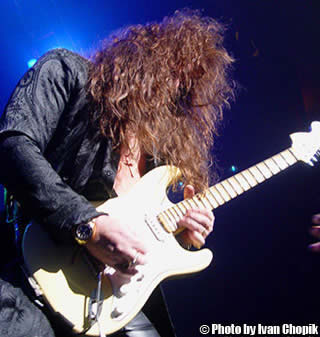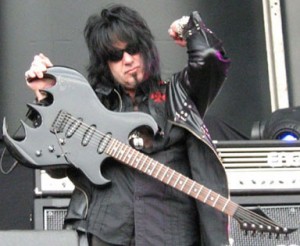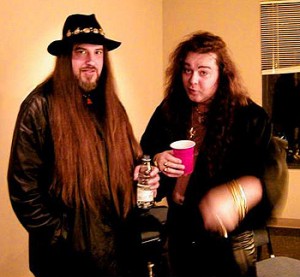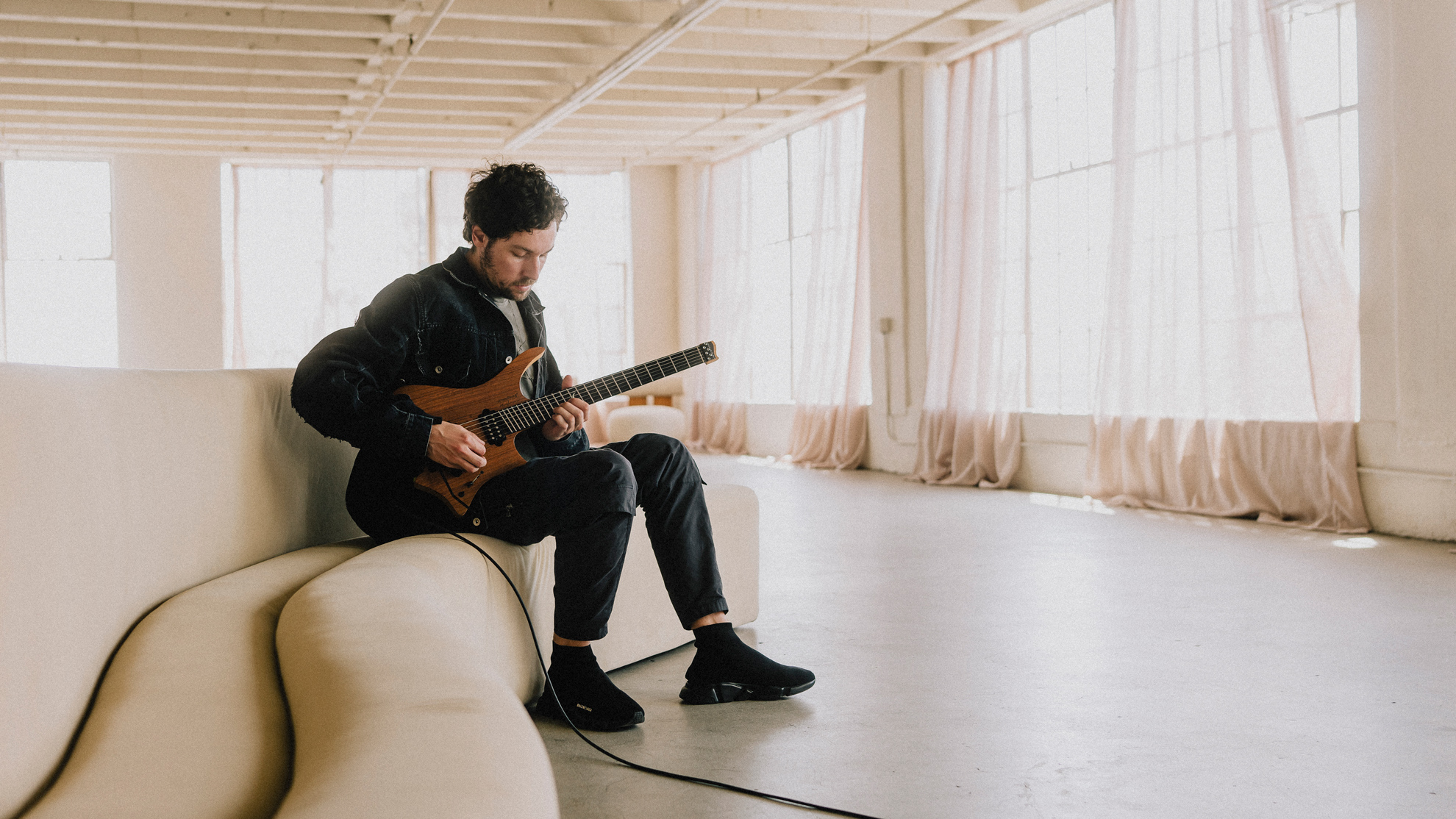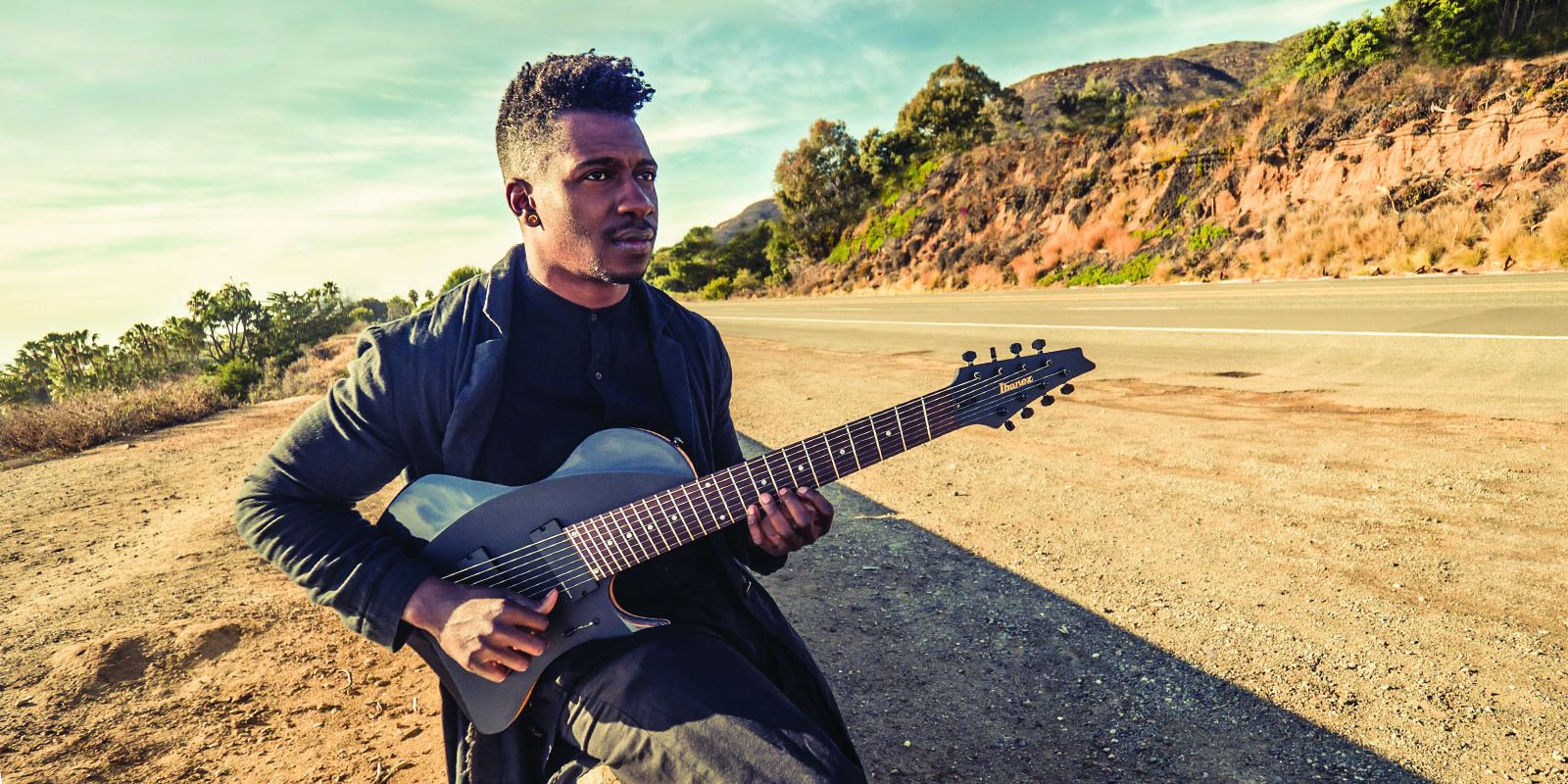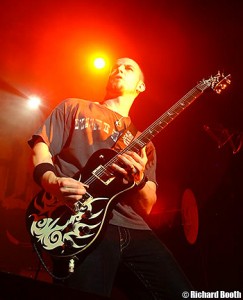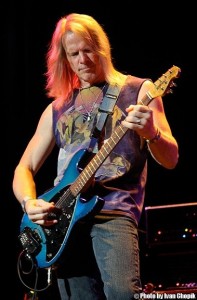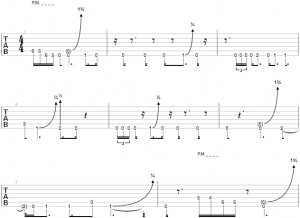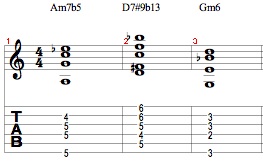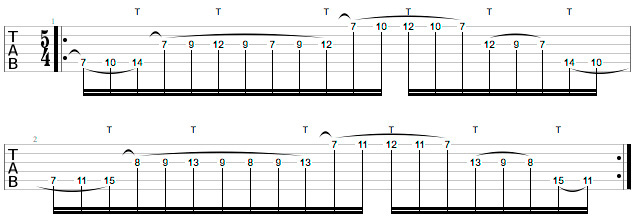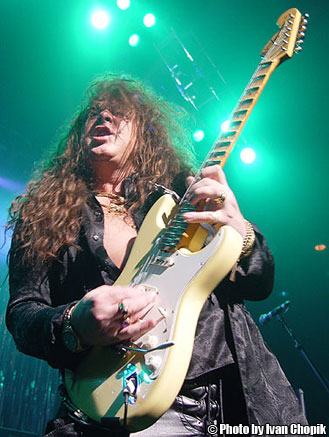 Yngwie Malmsteen is the undisputable king of neoclassical metal. Drawing from hard rock and blues influences in combination with classical music, he pioneered the genre in the early 1980’s and inspired countless musicians to this day to pursue extreme levels of guitar playing. Yngwie’s (pronounced ING-VAY) first album, Rising Force, rewrote the book on heavy metal guitar playing. Now, more than 20 years later, he shows no signs of slowing down with his latest release, Unleash the Fury. For more info on Yngwie and the new album, check out his website – www.yngwie.org.
Yngwie Malmsteen is the undisputable king of neoclassical metal. Drawing from hard rock and blues influences in combination with classical music, he pioneered the genre in the early 1980’s and inspired countless musicians to this day to pursue extreme levels of guitar playing. Yngwie’s (pronounced ING-VAY) first album, Rising Force, rewrote the book on heavy metal guitar playing. Now, more than 20 years later, he shows no signs of slowing down with his latest release, Unleash the Fury. For more info on Yngwie and the new album, check out his website – www.yngwie.org.
IC: Unleash the Fury is definitely one of your strongest albums to date. Was there anything you did differently during the creation process of this album?
YM: Up until the War to End All Wars album, which was the last album I did under the old management, it was pretty much done the way it always has been done; You tour on the album you have out and as soon as you come in you start writing songs, usually you keep someone in the room with you like a keyboard player or a drum programmer, and then you demo 20 songs or whatever and then you bring the band in and you rehearse it and then you bring an engineer in and you go to a studio and record the drums or whatever and then you finish your album that way. You’re basically under the gun of “this is the time you write, this is the time you record, and so forth and so on.” … now it’s a much more loose feeling. In a lot of ways, Unleash the Fury was done like Attack [previous album] only completely substance free, so-to-speak. (laughs)
IC: Can you tell us how the title Unleash the Fury came about?
YM: It’s obviously a tongue-in-cheek thing. It was a couple of years ago, when a sound byte came up on the Internet of me screaming on an airplane. Yeah, it happened. But it did happen in January 1988. Most people don’t know that, they think it happened in 2002. It’s a long story, but the whole band was flying to Japan and everybody at the time was really into drinking and being real assholes. So we were making all this noise on the airplane… the keyboard player was the worst. And then we fell asleep.
All of the sudden I got woken up by a lady that poured a pitcher of ice right on top of me saying ‘cool down, boys.’ Of course me, not everybody else. [Yngwie then shouted ‘You stupid bitch! You’ve unleashed the fucking fury!’ which later inspired the new album title] And for some reason, some twisted person in my crew actually recorded the incident and then 16 years later decided to put it on the Internet, which is very bizarre, but there you go. These things happen and I laughed at that when it came out and I thought it was just a funny thing to call the album that. Plus, the songs on the album I think are actually unleashing the fury… so that’s how the title came up. (laughs)
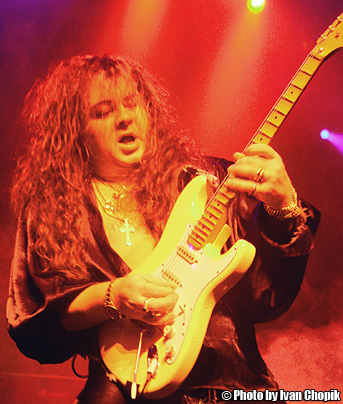 IC: Usually, you let other vocalists take care of all the singing on the album, but on this one you sing yourself on several tracks. How did this come about?
IC: Usually, you let other vocalists take care of all the singing on the album, but on this one you sing yourself on several tracks. How did this come about?
YM: Well, I used to be the singer in my band back in Sweden 27 years ago. It was a power trio. That was more out of necessity than anything else. I was never really into it too much, but that’s what I did. Over the years, I’ve been singing a lot on stage and I figured I’d just give it a go. And that particular take for ‘Cherokee Warrior’ is funny, because I just got a new microphone and Keith, my engineer and I said ‘hey, let’s sound test it’ and check the mic out for Doogie [White, vocals]. So we just screwed the mic up in a room and I said ‘ok, the let’s do the song that I’m probably gonna sing then.’
Then while we were mixing it we recognized that we got a pretty good performance, so we decided to just leave it. A lot of times, that’s the way I do things. Probably most people don’t know this, but I’m very spontaneous about these things. A lot of people still think that I’m really calculating this shit. But no – not at all. Fuck it, that’s the last thing that I’m gonna do. My playing maybe suggests that, because it’s pretty technical and all that shit, but the improvised spontaneity is always there and I like it like that. I hate when things are all figured out, I just don’t like that. This makes you work a lot harder to record, because to capture a moment, you gotta capture the right moment… because not every moment is gonna be fuckin’ great.
IC: What is your musical background? Have you ever received formal music education?
YM: That’s a good question. I can’t say that I didn’t, and yet I didn’t. I grew up in a family where I was the youngest. My older brother and sister were very good musicians and they played piano, violin, bass, drums, vocals, you name it – everything. My mother sang in the choir, my father played guitar, and my uncles were opera singers. So I grew up being surrounded by that all the time and I learned a lot from it. All the musical theory, because I do know it, came from that. But I did not go to school per se for it. To me, you learn it from somewhere, so it doesn’t matter where you get it from.
IC: People have been wondering – do you have perfect pitch?
YM: I do. It’s funny because my tennis teacher sometimes hits the tennis racket and goes ‘what note is this?’ and I joke around and say ‘it must be an F#.’ I’d say that I do, but it’s kind of a weird thing at the same time. Relative pitch I have for sure – 1 million percent. Basically, what I do when I sit around watching the TV or something (and I also have the Marshall and my guitars here) and if a commercial comes on or whatever I’ll just pick my guitar up and play what I hear from one time. That’s pretty much the same thing as perfect pitch. But if I was to stand in front of a piano and you hit the note, I might or might not say the right note. What I’m saying is, if you sing a melody, I can play it back at the same time.
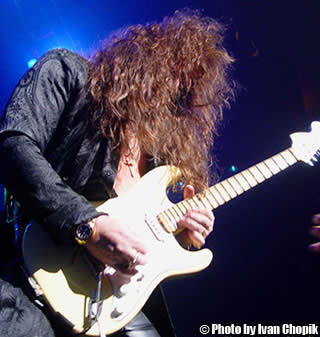 IC: What kind of influences did you have early on and how did you get started with playing the guitar?
IC: What kind of influences did you have early on and how did you get started with playing the guitar?
YM: My mother gave me a guitar on my 5th birthday, so I had a guitar. And I didn’t really play it then, because I was playing the trumpet, flute, and piano and all that shit. I didn’t like any of it, I wasn’t a very big fan of it. But when I was 7, I saw a news special on TV that Jimi Hendrix died. And they showed him burning the guitar. You didn’t hear the music, it was just him burning the guitar at Monterey Pop. It was the visual that made me wanna play guitar. So I started playing and right away I learned some blues licks and stuff like that.
About nine months later, I got Deep Purple’s Fireball for my birthday and that was a big impact on me with double bass drums and the way the band sounded and all that stuff. So Deep Purple’s Blackmore was definitely my biggest influence when I was 8 years old. But then after getting into that for a long time, by miles my biggest influence was violin, not guitar. And I know that sounds strange, but that’s when I heard Niccolò Paganini and his 24 Caprices. And I heard the vibrato and the arpeggios and everything, and I said ‘fuck, this sounds so cool. If I could just do something similar to that on the guitar, it would be cool.’ Vivaldi, Tchaikovsky, Paganini, Bach – with the pedal notes, arpeggios, linear scales – that’s all coming from there. But then the really hard sound of rock, I got that from loving to listen to Deep Purple’s ‘Speed King.’ So that came first and then the classical influence became very prominent.
IC: Can you talk a bit about your gear setup?
YM: Well, it’s very simple, very basic stuff. I use only Marshalls – old Marshalls without master volumes on them. So they’re not very practical for most people, because they’re all so fucking loud. You have to go all the way up – if you don’t, they don’t sound right. So Marshall is what I use for amps. As long as I can remember, I’ve been using Fender Stratocasters and they’re customized in some ways – scalloped neck, DiMarzio HS-3 and YJM pickups, and basically that’s it for changes to the guitar.
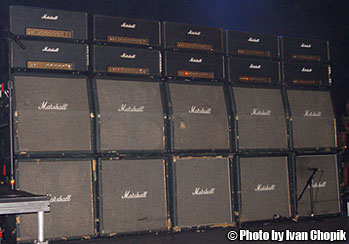
Yngwie’s live amp rig at G3 2003
It doesn’t really have much as far as effects go, in fact actually nothing. I use a DOD-250 preamp overdrive to smoothen the notes out and get more of a singing tone. It’s not a fuzz pedal, because that’s gonna give you distortion but that’s not gonna give you smoothness, because it adds shit that you don’t want as well. And that’s why with Marhsalls it’s so beautiful, because if they’re pushed right, (and you gotta push them all the fucking way) they will distort in a very harmonic way. And you can’t have really hot pickups. If you use really hot pickups that some people have, you fuck up the tone to begin with. You shouldn’t have a distorted signal from the guitar – the guitar should be clean and let the distortion come from the amp.
IC: You mentioned that you play scalloped necks. How did you come upon this concept and how exactly does it help your playing?
YM: It’s really a funny story about that. When I was a huge fan of Blackmore when I was a kid, there didn’t exist any internet, magazines, or information on what kind of gear people use or what they were doing. There was just a little picture in the album where you could see maybe a little bit of a guitar. I didn’t know that he was scalloping his guitar – I didn’t know that.
But I was a chosen apprentice when I was about 12 or 13 in a luthier shop in Stockholm and this old lute came in and I saw this scallop on it… so I just filed one of my necks and then I started doing it on one of my main guitars and so on. That’s just the way it happened. I think that the control you get over the string itself and vibrato is so much better. It doesn’t make it easier to play fast; it’s the other way around. (laughs) It makes you get a better grip on the string, that’s it.
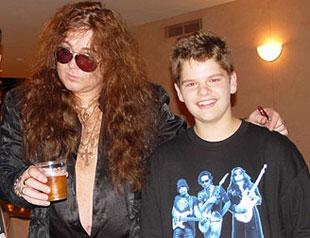
Yngwie with Ivan Chopik in 2003.
IC: What direction do you see your music going into in the future?
YM: I just let that happen the way it does happen. I notice though when I write my new songs that the things that I like or don’t like are going to go in a certain [direction]. People are going to be like ‘oh, that’s Yngwie Malmsteen,’ because that’s just the way it is. And I don’t try to do that and I don’t try not do that – it’s just something I do. And it tends to happen like a natural thing.
IC: Is there any advice you can give to aspiring musicians?
YM: Play as much as you can with other guys and learn from each other. Being a musician is not necessarily being what someone already did. I think it’s important to have heroes, goals, and influences, but at the end of the day when everything is said and done, you gotta make your own mark. And it’s a tough thing to do. I think it is maybe the most difficult thing to do. But if you find something, God bless you – all the best. There’s really no shortcut to anything, it’s just a lot of practicing, playing, and jamming – that’s the way to go.



